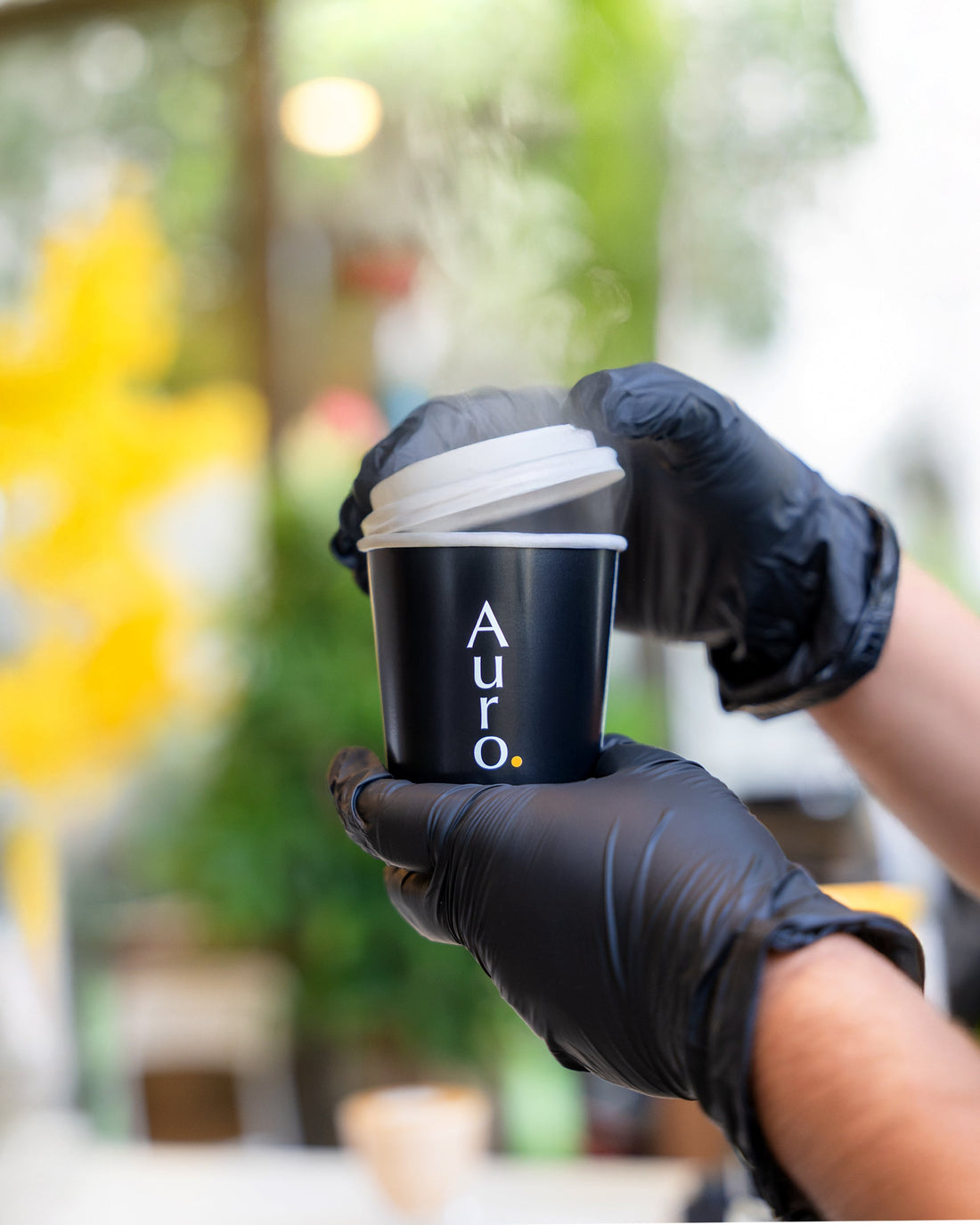
كيف تؤثر جودة المياه على نكهة القهوة (وكيفية إصلاح ذلك في المنزل)
شارك
عندما تُحضّر قهوتك الصباحية، ربما تعتقد أن حبوب البن هي أهم عنصر، لكن هل تعلم أن القهوة تتكون من 98% ماء تقريبًا ؟ هذا يعني أن جودة الماء تلعب دورًا كبيرًا في مذاق قهوتك. إذا كان مذاق قهوتك باهتًا أو مرًا أو غير مستساغ، فقد يكون السبب هو الماء.
في هذا الدليل، سنشرح كيف تؤثر جودة المياه على نكهة القهوة، وما الذي يجعل مياه التحضير جيدة، وطرق سهلة لإصلاحها في المنزل - وهو أمر مفيد بشكل خاص لمحبي القهوة في الإمارات العربية المتحدة ، حيث تختلف ظروف المياه من مياه الصنبور إلى المياه المعبأة في زجاجات.
لماذا تُعدّ جودة المياه مهمة للقهوة؟
القهوة غنية بمركبات النكهة التي تذوب في الماء أثناء التحضير. وتحدد المعادن والتوازن الكيميائي في الماء مقدار استخلاص هذه النكهات.
إن زيادة المعادن (الماء العسر) أو نقصها (الماء اليسر) يمكن أن يخل بالتوازن - مما يجعل كوبك إما باهتًا أو مرًا للغاية.
الهدف؟ الحصول على ماء يستخلص القهوة بالشكل الأمثل - ناعم، عطري، ومتوازن.
شرح كيمياء القهوة والماء
يعمل الماء كمذيب - فهو يسحب الزيوت والأحماض والروائح من البن المطحون.
إليكم ما يحدث أثناء عملية التخمير:
- الماء العسر (الغني بالكالسيوم والمغنيسيوم) يستخلص المزيد من المرارة.
- الماء العذب (الذي يحتوي على نسبة منخفضة من المعادن) يستخلص كمية قليلة جدًا من المواد، مما يجعل طعم القهوة حامضًا أو ضعيفًا.
-
يساعد الماء المتوازن على استخلاص كل من الحلاوة والحموضة بالتساوي.
إذا كان طعم قهوتك الإسبريسو أو القهوة المقطرة "غير جيد"، فقد لا يكون السبب هو حبوب البن، بل هو... كيمياء الماء.
كيف تؤثر المعادن على مذاق القهوة
معادن مثل الكالسيوم والمغنيسيوم والبيكربونات تلعب دورًا كبيرًا في نكهة القهوة.
- الكالسيوم يُضفي قوامًا، لكن الإفراط فيه قد يُخفف من الحموضة.
- المغنيسيوم يعزز النكهات المشرقة والفاكهية.
-
البيكربونات يعمل على تخفيف الحموضة، لكن ارتفاع نسبة الحموضة قد يجعل طعم القهوة طباشيريًا.
لهذا السبب يستخدم صانعو القهوة غالبًا المياه المفلترة أو المتوازنة المعادن أثناء التخمير.
قهوة بماء الصنبور مقابل قهوة بالماء المفلتر
في الإمارات العربية المتحدة ، غالباً ما يتم تحلية مياه الصنبور وقد تحتوي على آثار من الصوديوم أو الكلور - وكلاهما يؤثر على النكهة.
- قد يجعل ماء الصنبور طعم قهوتك مالحاً أو باهتاً.
- يوفر الماء المفلتر أو المعبأ في زجاجات كوبًا أنظف وأكثر سلاسة.
إذا كنت تستخدم مياه الصنبور، ففكر في تركيب فلتر كربون أو فلتر التناضح العكسي لإزالة المعادن الزائدة والكلور.
درجة حرارة الماء المثالية لتحضير القهوة
تؤثر درجة حرارة الماء أيضاً على عملية الاستخلاص:
- النطاق المثالي هو 90 درجة مئوية - 96 درجة مئوية (195 درجة فهرنهايت - 205 درجة فهرنهايت).
- قهوة ساخنة جداً ← قهوة مُرّة.
-
بارد جدًا ← قهوة حامضة وغير مستخلصة جيدًا.
استخدم مقياس حرارة أو غلاية مزودة بخاصية التحكم في درجة الحرارة للحصول على أفضل النتائج.
مستويات المواد الصلبة الذائبة الكلية لتحضير القهوة
يشير اختصار TDS إلى إجمالي المواد الصلبة الذائبة - وهي المعادن الموجودة في مياهك.
للحصول على قهوة مثالية:
- النطاق المثالي لنسبة المواد الصلبة الذائبة الكلية : 75-150 جزء في المليون.
- أقل من 50 جزءًا في المليون ← طعم مائي.
-
أعلى من 200 جزء في المليون ← طعم عكر أو مر.
يمكنك شراء جهاز قياس المواد الصلبة الذائبة (TDS) عبر الإنترنت لفحص مياه منزلك بسهولة.
كيفية إصلاح طعم القهوة السيئ الناتج عن الماء
إذا لم يكن مذاق قهوتك جيدًا، فإليك ما يمكنك فعله:
- استخدم الماء المفلتر أو المعبأ في زجاجات (مع معادن معتدلة).
- تجنب الماء المقطر - فهو "فارغ" للغاية ويستخلص بشكل سيئ.
- نظف آلة القهوة بانتظام لإزالة تراكم المعادن.
-
تجربة — قم بتحضير نفس القهوة باستخدام أنواع مختلفة من الماء للعثور على التوازن المفضل لديك.
تغيير بسيط في الماء يمكن أن يُحدث فرقاً كبيراً في النكهة!
هل ترغب بمعرفة المزيد؟
إذا كنت تستمتع بالتعمق أكثر في علم القهوة، فراجع مدونتنا الأخرى —
الكيمياء وراء فنجان قهوة مثالي: ما يحدث فعلاً عند تحضير القهوة وشرح عملية استخلاص الإسبريسو: ما هو المذاق الحامض جداً، أو المر جداً، أو المذاق المثالي
وإذا كنت ترغب في تذوق مشروبات متوازنة تمامًا، فاستكشف مجموعتنا المميزة من القهوة - فنحن فخورون بكوننا أحد أفضل العلامات التجارية في هذا المجال. أفضل موردي القهوة في الإمارات العربية المتحدة ، يقدمون النضارة والنكهة في كل كوب.
أسئلة شائعة حول جودة المياه ونكهة القهوة
س1: ما هو أفضل ماء لتحضير القهوة؟
أ: استخدم ماءً نظيفاً مُرشّحاً يحتوي على نسبة معتدلة من المعادن (75-150 جزء في المليون من إجمالي المواد الصلبة الذائبة). تجنّب الماء المقطر أو الماء شديد العسر.
س2: هل يمكن أن يؤثر ماء الصنبور على مذاق قهوتي؟
ج: نعم. قد يحتوي ماء الصنبور على الكلور أو الصوديوم أو الكثير من المعادن التي تؤثر على توازن ورائحة قهوتك.
س٣: كيف يمكنني تحسين مذاق القهوة في المنزل؟
ج: جرب استخدام الماء المفلتر أو المعبأ في زجاجات، واضبط درجة حرارة التحضير، ونظف آلة القهوة بانتظام.
س4: ماذا يحدث إذا استخدمت الماء العذب لتحضير القهوة؟
ج: يمكن أن يتسبب الماء العذب في عدم استخلاص القهوة بشكل كافٍ، مما يؤدي إلى قهوة باهتة أو ذات مذاق حامض.
الخاتمة
غالباً ما يُغفل عن أهمية الماء في تحضير القهوة، مع أنه العنصر الذي يُحدد جودتها. بمجرد أن تبدأ بالاهتمام بجودة الماء، ستلاحظ أن مذاق قهوتك أصبح أنقى وأكثر سلاسة وتوازناً، تماماً كما ينبغي أن تكون.
